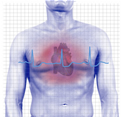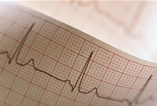Cardiac Catheterization
 Cardiac catheterization is a minimally invasive procedure in which a long, thin tube called a catheter is guided into the heart, usually through a blood vessel in the leg or arm. Once inside the heart, it can be used to diagnose a problem (diagnostic uses) or to treat a problem (therapeutic uses). Cardiac catheterization is a minimally invasive procedure in which a long, thin tube called a catheter is guided into the heart, usually through a blood vessel in the leg or arm. Once inside the heart, it can be used to diagnose a problem (diagnostic uses) or to treat a problem (therapeutic uses).
Balloon Angioplasty
Balloon angioplasty is one of three standard treatments for coronary artery disease (CAD) – a disease in which the blood flow to the heart is restricted due to hardened arteries (atherosclerosis) that are clogged with plaque deposits. The other standard treatments for CAD are medication and bypass surgery.
The goal of balloon angioplasty is to push the fatty plaque back against the artery wall to make more room for blood to flow through the artery. This improved blood flow results in the improvement of cardiac symptoms and function.
Electrophysiology
 An electrophysiology study (EP study) is a procedure in which a thin tube (catheter) is inserted into a vein or artery (e.g., in the groin) and guided to the heart, where it can perform highly specific measurements of the heart’s electrical activity and pathways. These measurements are particularly helpful in the diagnosis of abnormally fast heart rhythms (tachycardias) or abnormally slow heart rhythms (bradycardias). An EP study is typically performed only after other noninvasive tests, such as an electrocardiogram (EKG), have been performed. An electrophysiology study (EP study) is a procedure in which a thin tube (catheter) is inserted into a vein or artery (e.g., in the groin) and guided to the heart, where it can perform highly specific measurements of the heart’s electrical activity and pathways. These measurements are particularly helpful in the diagnosis of abnormally fast heart rhythms (tachycardias) or abnormally slow heart rhythms (bradycardias). An EP study is typically performed only after other noninvasive tests, such as an electrocardiogram (EKG), have been performed.
Ablation
The minimally invasive method of ablation involves inserting a thin tube (catheter) through a blood vessel (in the upper thigh, wrist or arm) and all the way up to the heart. This tube is tipped with equipment to destroy the selected cardiac tissue, usually with radiofrequency energy. This procedure is often performed by a heart specialist called an electrophysiologist. Ablation has become the preferred technique for treating many forms of tachycardia, and the American Heart Association estimates that radiofrequency ablation (the most common type) is used successfully over 90 percent of the time.
Permanent Pacemaker
Pacemakers are electronic devices that may stimulate either the upper chambers of the heart (atria), lower chambers (ventricles) or both. In addition, some pacemakers are built with an internal device that can shock the heart back into a regular rhythm in the event a dangerous arrhythmia (implantable cardioverter defibrillator).
Pacemakers are most commonly used to correct an abnormally slow heartbeat by sending electrical impulses to one or more chambers of the heart.
Back to Top
Implantable Defibrillator
An implantable cardioverter defibrillator (ICD) is a device that is implanted in the chest to constantly monitor and correct abnormal heart rhythms (arrhythmias). The devices were developed originally to correct heart rhythms that are too fast, but recent technological advances have increased the pool of possible patients who may benefit from an ICD.
Clinical Cardiology
Clinical cardiology is general consultative services that is given by the your physician.
Echocardiography
 Also known simply as an “echo,” an echocardiogram is a common diagnostic test that uses sound waves to create pictures of the heart and its vessels. It may also be called a transthoracic echocardiogram. The word “transthoracic” means “across the chest.” Also known simply as an “echo,” an echocardiogram is a common diagnostic test that uses sound waves to create pictures of the heart and its vessels. It may also be called a transthoracic echocardiogram. The word “transthoracic” means “across the chest.”
The echocardiogram uses high-frequency sound waves (ultrasound) to get a picture of the four heart chambers and the four heart valves. The sound waves bounce back from the heart chambers and valves, producing images and sounds that can be used by the physician to detect damage and disease.
Back to Top
|